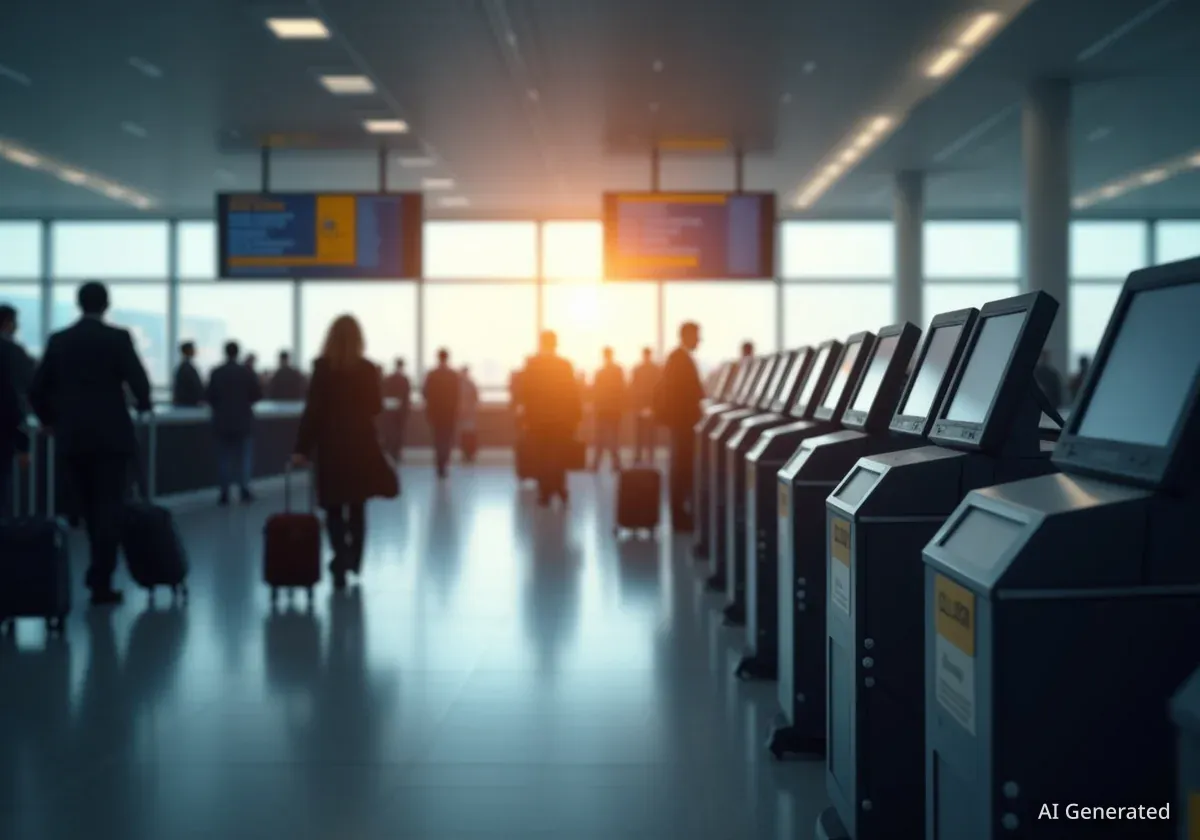Ryanair has stated it may be forced to cancel up to 600 flights per day next week due to a planned strike by French air traffic controllers. The industrial action, scheduled from October 7 to 10, could affect as many as 100,000 passengers daily, disrupting travel across Europe.
Key Takeaways
- Ryanair anticipates cancelling up to 600 flights daily during the French air traffic control (ATC) strike from October 7-10.
- The strike action could impact an estimated 100,000 passengers each day.
- CEO Michael O'Leary is calling for the European Union to protect flights that pass over France but do not land there.
- Flights from the UK to popular destinations like Spain, Italy, and Greece are expected to be affected.
French ATC Strike to Disrupt European Travel
The largest air traffic control union in France, SNCTA, has called for a strike that will significantly reduce airspace capacity over Western Europe. The action is planned to run from October 7 through October 10.
While airlines will only receive final confirmation of the required cancellations closer to the dates, Ryanair has projected a severe impact on its operations. The airline's CEO, Michael O'Leary, stated that the company expects to be instructed to cancel hundreds of daily flights.
Impact on Overflights and Holiday Routes
The primary issue for many travelers is that the strike affects not only flights to and from France but also those that fly through French airspace. This includes many popular routes from the United Kingdom and Northern Europe to holiday destinations in the south.
Travelers heading to countries such as Spain, Italy, and Greece are likely to face disruptions, as these routes frequently cross over France. Other airlines have not yet released specific figures on potential cancellations but are also expected to be impacted.
Recent Strike Disruption
This is not the first time French ATC strikes have caused widespread delays. According to Ryanair, a strike on September 18 led to significant delays for over 190 of its flights, affecting 35,000 passengers. Another recent, smaller strike resulted in the cancellation of 30 Ryanair flights.
Ryanair Demands EU Intervention
In response to the recurring disruptions, Ryanair CEO Michael O'Leary has intensified his campaign for European Union intervention. He argues that the EU must take action to protect the single market and the freedom of movement for passengers whose flights do not originate or terminate in France.
O'Leary has publicly called on European Commission President Ursula von der Leyen to implement measures that safeguard overflights during national strikes.
"We cannot have a situation in the EU where we have a single market yet we close that market every time the French go on strike," O'Leary stated. "They have the right to strike, but if flights are to be cancelled they should be flights arriving to and from France. They should not be overflights."
Proposed Solutions
As a potential solution, Ryanair has suggested that Eurocontrol, the European organization for the safety of air navigation, could be empowered to manage flights over French airspace during strikes. This would allow air traffic from other countries to continue operating even while French domestic flights are grounded.
O'Leary's statement continued with a direct challenge to the EU leadership:
"We’re calling again on Ursula von der Leyen, European Commission president … If she’s not willing to defend the single market, if she’s not willing to protect overflights, then she should go.”
Broader Strain on European Airspace
French ATC strikes are a major source of disruption, but they are part of a wider set of challenges facing European aviation. Since the pandemic, some air traffic control centers have struggled with staff shortages. Occasional technical failures have also contributed to delays. Furthermore, the closure of Ukrainian and Russian airspace has rerouted significant traffic, placing additional strain on existing flight paths and forcing air traffic controllers to delay more flights to manage congestion.
Wider Industry Concerns
While Ryanair has been the most outspoken critic, other major airlines have also expressed concerns about the role of air traffic control in widespread flight delays. The cumulative effect of strikes, staffing issues, and geopolitical airspace restrictions creates a volatile environment for both airlines and passengers.
The recurring nature of these strikes has led to calls from across the industry for a more unified European approach to managing air traffic. Airlines argue that a single country's labor dispute should not be allowed to paralyze travel across the entire continent.
What Travelers Should Do
Passengers with flights scheduled between October 7 and 10, particularly those flying over France, should monitor their flight status closely. Airlines are required to notify passengers of cancellations as soon as possible.
- Check your airline's website and mobile app for the latest updates.
- Ensure your contact information with the airline is up to date to receive notifications.
- Understand your rights regarding rebooking or refunds in the event of a cancellation.
As the strike dates approach, airlines will provide more specific information on which flights will be affected. Both EasyJet and British Airways were also contacted for comment on their potential disruption levels.





